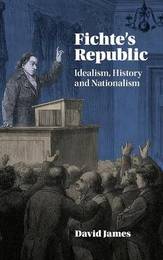
|
Fichte's Republic: Idealism, History and Nationalism
Hardback
Main Details
| Title |
Fichte's Republic: Idealism, History and Nationalism
|
| Authors and Contributors |
By (author) David James
|
| Physical Properties |
| Format:Hardback | | Pages:240 | | Dimensions(mm): Height 235,Width 158 |
|
| Category/Genre | Western philosophy - c 1600 to c 1900
Social and political philosophy |
|---|
| ISBN/Barcode |
9781107111189
|
| Classifications | Dewey:193 |
|---|
| Audience | | Professional & Vocational | |
|---|
|
Publishing Details |
| Publisher |
Cambridge University Press
|
| Imprint |
Cambridge University Press
|
| Publication Date |
9 October 2015 |
| Publication Country |
United Kingdom
|
Description
The Addresses to the German Nation (1808) is one of Fichte's best-known works. It is also his most controversial work because of its nationalist elements. In this book, David James places this text and its nationalism within the context provided by Fichte's philosophical, educational and moral project of creating a community governed by pure practical reason, in which his own foundational philosophical science or Wissenschaftslehre could achieve general recognition. Rather than marking a break in Fichte's philosophy, the Addresses to the German Nation and some lesser-known texts from the same period are shown to develop themes already present in his earlier writings. The themes discussed include the opposition between idealism and dogmatism, the role of Fichte's 'popular' lectures and writings in leading individuals to the standpoint of idealism, the view of history demanded by idealism and the role of the state in history.
Author Biography
David James is Assistant Professor of Philosophy at the University of Warwick. He is the author of Rousseau and German Idealism: Freedom, Dependence and Necessity (Cambridge, 2013) and Fichte's Social and Political Philosophy: Property and Virtue (Cambridge, 2011).
Reviews'In his enlightening new book David James turns to the question of what becomes of Fichte's idealist subject when it is transposed into the political realm, challenging both those who would see in Fichte an ideologue and those who would divorce Fichte's political writings from his systematic writings.' Stefan Bird-Pollan, University of Vienna
|